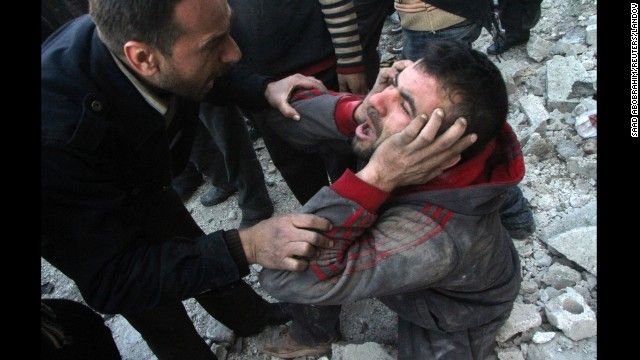Damascus softens its stance as next Geneva talks near
(CNN) — Syrian Foreign Minister Walid Moallem announced Friday moves that appear to be intended to ease the strife in Syria and show that Damascus is amenable to changes, just before a peace conference scheduled for Wednesday in Geneva, Switzerland.
In Moscow at a joint news conference with Russian Foreign Minister Sergey Lavrov, Moallem said he had handed Lavrov a proposal “to determine the time and date where there will be an end to the military operations” in Aleppo and urged him to help broker its passage.
“We will wait for Minister Lavrov to tell us the time and the date, the hour, and we will commit ourselves to these arrangements — if he has enough guarantees that the other side will accept and commit themselves as well,” he said.
If that succeeds, he said, Damascus is prepared to extend the plan to other areas of the country.
In addition, he said, the Syrian government had delivered humanitarian aid to one village and was planning to coordinate with United Nations organizations to deliver aid to another village.
“The success of such a mission will lead to repeating that again in other villages, if the armed men and the terrorists continue to commit not to open fire on the relief convoys,” he said. The Syrian government typically refers to rebels as “terrorists.”
Moallem added that he is willing to swap government-held prisoners for forces kidnapped by rebels.
“We will exchange lists of the names so we can determine the mechanisms of implementing the exchange,” he said.
Moallem said he was confused about comments made Thursday in Washington by U.S. Secretary of State John Kerry, who referred to Syria as the “strongest magnet for terror of any place today.”
“How come the United States condemns terrorism in Iraq and supports the Iraqi government in its war against ISIS?” he asked, referring to the al Qaeda-linked Islamic State of Iraq and Syria. “This is a position that we highly appreciate, and we appreciate all the efforts made by Iraq to combat terror, yet we don’t understand how the United States supports the same terrorists when they are fighting our troops in Syria. This is the true conspiracy that we are facing.”
He added that the United States “was the first country to encourage those people to come to Syria.”
On Friday, Kerry said that Syrian President Bashar al-Assad cannot remain at the helm if Geneva 2 is to succeed.
“It will become clear that there is no political solution whatsoever if Assad is not discussing a transition and if he thinks he is going to be a part of that future,” Kerry said. “It is not going to happen. The people who are the opponents of this regime will never, ever stop.”
Rebels discussing peace talks
At the same time, the divided opposition Syrian National Coalition was meeting Friday in Istanbul to decide whether to join the peace talks and, if so, on what basis. The National Coalition’s media office said it would discuss nominating delegation members, electing political committee members and nominating interim ministers for the positions of health, education and interior affairs.
The head of the Damascus Declaration for Democratic National Change, Fida Akram Al-Hurani, said she was prepared to remain in the coalition even if its leaders decided to attend the talks.
“I believe that we can go ahead and announce that we do not agree to engage in peace talks with the criminal regime, but out of respect for the unity of the coalition and our structure as a unified body — that we paid for it with the blood of the Syrian people at the hands of the regime — we will stay in the NC” and monitor the developments in Geneva.
“If we see that wrong decisions and concessions are being made, we will then announce at the right moment our withdrawal from the coalition, because we will never compromise on the sacrifices of the Syrian people.”
Rockets, shells hit Lebanese territory
As the halting diplomatic efforts were continuing, so too was the violence. In the latest in a series of incidents that threaten to involve Lebanon in the civil war next door, 20 rockets and shells were launched from Syria about noon Friday and targeted a number of Lebanese towns, the Lebanese military said on its website.
Some of the rockets landed in Labweh and Zaboud plains and near Hermel village, which is mostly Shiite, and in the Bekaa Valley, Lebanon’s state news agency NNA reported.
No one was hurt in the town, which is a Hezbollah stronghold, it said.
On Thursday, a bomb blast ripped through Hermel, killing three people and wounding 26, NNA reported.
NNA also reported that seven people — six of them children — were killed in the eastern border town of Arsal and that 15 others were wounded in a rocket attack from the Syrian side.
Arsal is known for its links to Lebanese Sunni rebel sympathizers; some of its residents are believed to be fighting under the banner of the radical group al-Nusra Front.
It was not immediately known who fired the rockets.
Hezbollah, the militant Shiite movement, has been backing the Syrian government in its fight against anti-government rebels.


